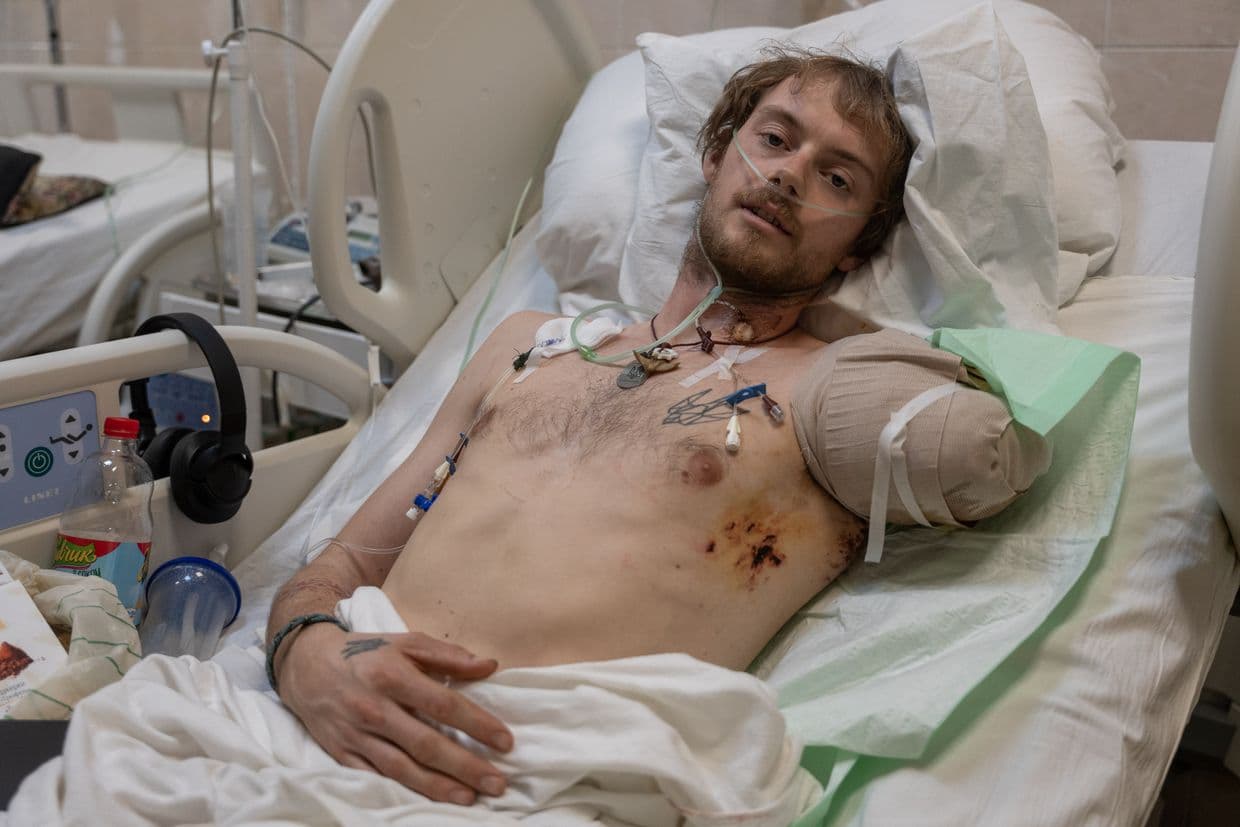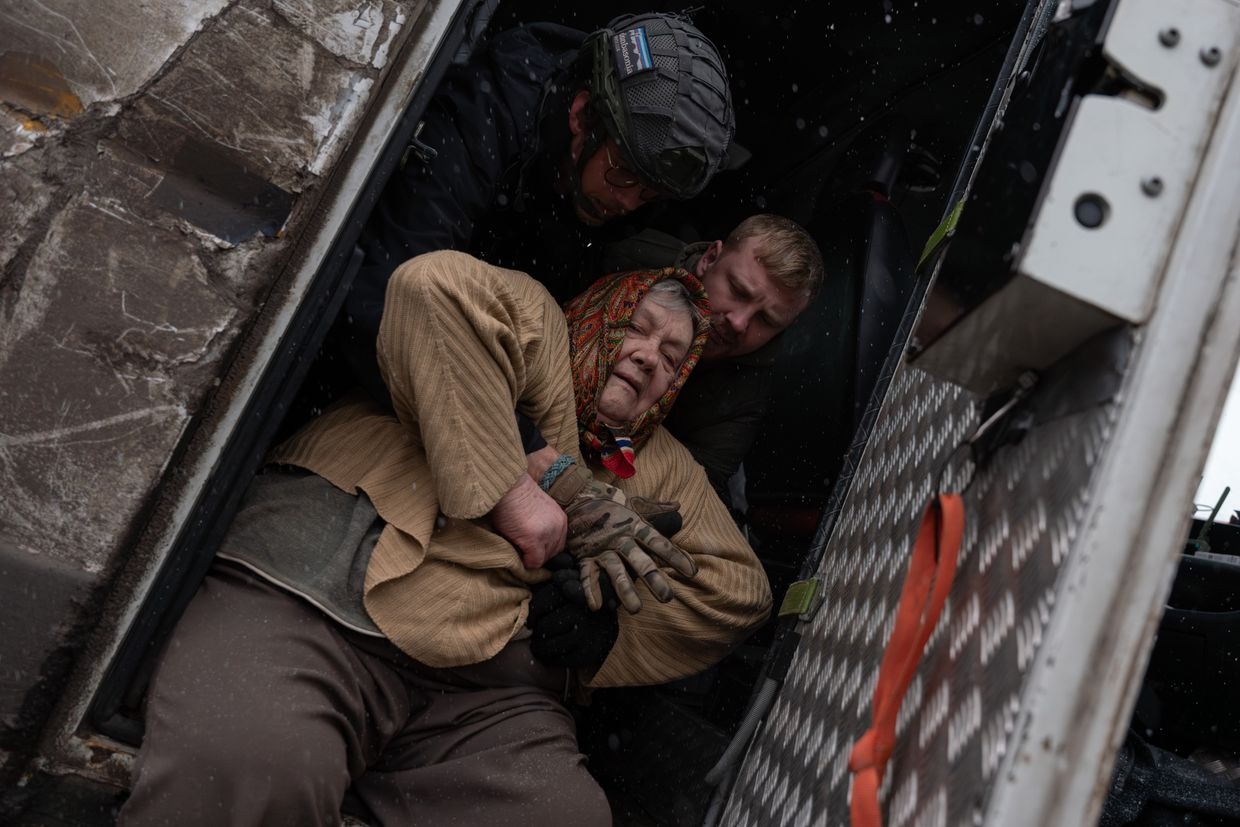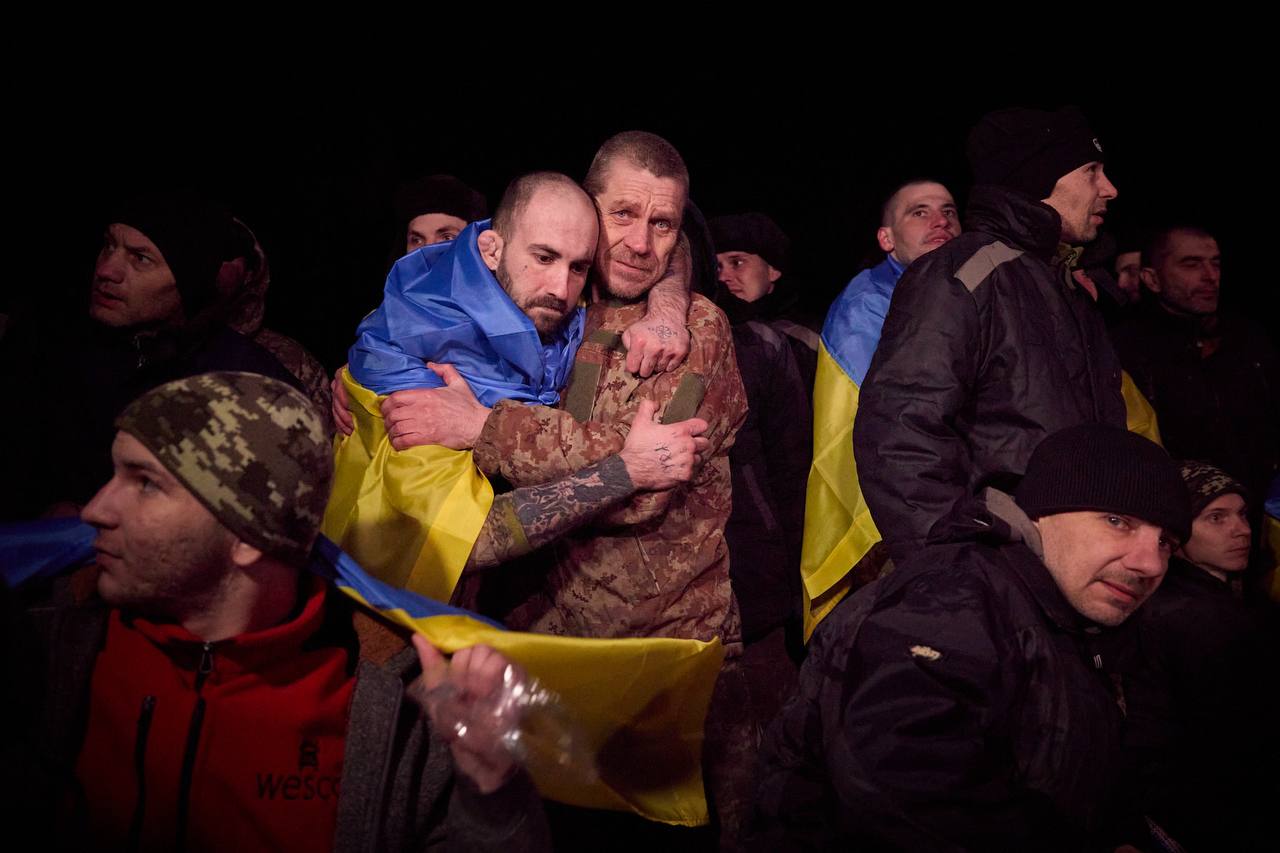British volunteer who lost arm and leg evacuating Ukrainian civilians: ‘Russia is the enemy. How can you not see it?’

Edward Scott, a British humanitarian aid worker with the Ukrainian NGO "Base UA" in the hospital in Kyiv, on Feb. 2, 2025. (Madison Tuff)
It could have been a tragic story costing British volunteer Edward Scott his life.
As a humanitarian aid worker with the Ukrainian NGO "Baza UA" (the "Base UA" in Ukrainian), 28-year-old Scott has made multiple trips to the front-line areas to evacuate civilian Ukrainians.
But the mission on Jan. 30 to the embattled city of Pokrovsk in southern Donetsk Oblast was different.
A Russian drone targeted the vehicle of Scott’s crew – though it was marked with a bright sign reading "evacuation." The car was carrying two civilians and two volunteers. The driver's seat — where Scott had been sitting – was hit hardest, leaving him severely injured.
As Russian forces continue to rapidly advance in eastern Ukraine, the Ukrainian government and volunteers have intensified efforts to evacuate civilians from front-line towns in Donetsk Oblast. With Russian forces just mere kilometers away, Pokrovsk remains under constant artillery and drone attacks, making evacuation missions a high-risk endeavor.
“(There was) massive explosion. I see this fireball, and the car is knocked out of gear," Scott recalls the moment of impact. "I'm trying to force it in gear, but my foot is not working, and at the same time, I'm trying to turn the wheel, and I can feel my shoulder turning, but I can see my arm on the wheel, not turning, so I'm like 'This is bad.'"
"I'm trying to force it in gear, but my foot is not working, and at the same time, I'm trying to turn the wheel, and I can feel my shoulder turning, but I can see my arm on the wheel, not turning, so I'm like 'This is bad.'"
"And then the pain hits me, and I start screaming."
What happened next was a brilliant coordination of actions that saved Scott's life. Seconds after the attack, his mission partner, Pylyp Rozhdestvenskyi, was applying tourniquets to his shredded arm and leg to stop the bleeding.
Minutes later, Scott was already in a military car on his way to the neighboring hospital for medical assistance. There, he received a transfusion of about four liters of blood, but severe injuries resulted in amputations of his left arm and leg.
Weeks after the brutal attack, with multiple surgeries behind him and more still ahead, Scott, now undergoing treatment at a Kyiv hospital, thinks about how he can continue helping Ukraine — the country he now calls home.
"I want to primarily help Ukrainians but also show the world that we are fighting people who will happily commit war crimes at the drop of a hat," he told the Kyiv Independent from his hospital bed.
'Place to be'
Scott paid his first visit to Ukraine in October 2022. By the time Russia’s full-scale war began in February that year, he was already becoming more "politically engaged" and "disillusioned" with his former life as a sailor.
"It was a fantastic job," he says. "I had amazing adventures and sailed across the Atlantic nine times. I've been to beautiful places. But at the end of the day, I wasn't helping anyone."
As he was following the U.K. soldiers fighting in Ukraine and humanitarian workers operating there on social media, Scott began to think: "Maybe I can do that."
"So I bought a pickup truck and just drove to Ukraine," he recalls. "My plan was to come here for three months, to make a difference, to donate a truck at the end of it, and go back to boats."

"But very early on, I thought: 'No, this is the place to be.'"
Since then, Scott has visited some of Ukraine's hardest-hit areas, including the now-destroyed and occupied city of Bakhmut, delivering various equipment and humanitarian aid. He also supported Ukrainians by helping repair the roofs of their homes alongside other volunteers from the Base UA NGO.
The more he traveled through Ukraine meeting its people, the deeper his appreciation for the country and its culture has become.
One of his warmest memories was when an elderly woman gave the volunteers the best homemade meal and care after they helped with repairs at her home.
"I met amazing people here," Scott says, adding that he even became a godfather to the daughter of one of his Ukrainian friends. "I have a family here now."
In December, as intense battles unfolded in the Pokrovsk area, Scott was called to assist with the civilian evacuation effort there. He had just started his second two-week rotation there when he noticed that "things had deteriorated massively."
"(When we started) we could still drive through Pokrovsk, it was kind of okay," Scott says. "We evacuated people from the last apartment block in the south (of the city)."


"But suddenly, we could no longer go south."
Scott says that each time they entered the area, they could either see Russian drones on the ground or hear them in the air. "The last few days before the hit there were a lot of them."
"We were very aware that it's very dangerous and we thought we were protecting ourselves by being as civilian as possible, showing that we are not a target. But we got hit as well," he says.
'A very tough guy'
Scott and Rozhdestvenskyi, 31, left their base in the city of Kramatorsk at around 8:20 a.m., heading to Pokrovsk to evacuate a woman whose husband was hit by a Russian drone in his car just a day before.
When they found out the woman had fled with another crew, the two started looking for other locals who needed assistance. They ended up evacuating three people in their first drive and returned to pick up two more.
According to Rozhdestvenskyi, the road they took was in "quite bad condition," so the team had to drive relatively slowly. That was when the drone hit their car.
"I wasn't in shock because I had a similar situation two months ago, and I more or less understood what had happened. But this time, the explosion was more powerful than the previous one," Rozhdestvenskyi says.
"Looking at the pictures of the van now, I realize that they didn't just target the van; they targeted me. They targeted the driver," Scott says. He was the only one severely injured.


When he saw that their car no longer had a roof, Rozhdestvenskyi realized that if there was a second drone attack to follow, they wouldn't survive. He decided to act immediately. He got out of the car and applied tourniquets on the shredded arm and leg of his mission partner.
"I wasn't sure the tourniquet would work because there were just bones in front of my eyes," Rozhdestvenskyi says.
As he was providing first aid, Rozhdestvenskyi spotted a military vehicle and shouted to the soldier asking for help. He grabbed Scott under his arms, pulled him out of the car, and carried him to the military pickup bed. Scott says he was conscious and remembers the ride.
"I could feel myself lying in the back of the truck, and the roads were terrible, so we were obviously moving pretty fast. I was being jostled around with horrific levels of pain," Scott says.
"I remember the weight of my arm on my chest. I was holding my wrist because my arm kept on falling off my chest."
They quickly reached a small medical point nearby, where paramedics and a casevac were already waiting for them to head to the hospital. Rozhdestvenskyi says it took them around 40 minutes from the moment of the attack to reach a hospital in nearby Dobropillia.
Upon arrival, Scott had suffered such massive blood loss that doctors had to transfuse around four liters of blood and perform the amputations. But thanks to the unified effort of Rozhdestvenskyi and the military, Scott's life was saved.
"I'm lucky in so many ways as so many little things that… (could have gone wrong)," he says.
Donetsk Oblast Prosecutor’s Office told the Kyiv Independent that they were investigating the attack as a potential war crime.
A video showing Scott hugging Rozhdestvenskyi at the hospital in Dnipro, where he was transported shortly after the surgery, and thanking him for saving his life went viral across social media.
"He did; he really saved my life," Scott says. "He was the one that did the hard work."
"He is a hero."
Rozhdestvenskyi returns the compliments, saying that Scott “is a very tough guy for his age.”
"He always had a firm stance on helping people and his mission in Ukraine, and I was always impressed by that."
Staying in Ukraine
After waking up after surgery, Scott was told that a medevac flight to the U.K. was being prepared for him.
“The first thing I said was, ‘I'm staying in Ukraine.’ I turned it down right away.'"
His treatment in Ukraine was funded by the U.S. RT Weatherman Foundation, which says it was “an honor” to help Scott.
“We were touched by Eddie’s service to Ukraine and his sacrifice for its people. When we were asked to help, the RT Weatherman Foundation didn’t hesitate — days after his injury, we evacuated him from Dnipro to Kyiv so that he could recuperate in the best possible conditions,” the foundation’s program manager in Ukraine, Roman Zhura, told the Kyiv Independent.
Scott’s parents visited him in Kyiv, with Ukraine quickly growing on them too.
"I've changed my life, for better or for worse, but I've suddenly changed my family's. Now (my dad) is telling everyone (in the U.K.): 'Ukraine's amazing.'"

Supported by his dearest friends, Scott not only envisions his future in Ukraine but also sees a new mission for himself: to advocate for the country and its people, helping in any way he can.
Through his difficult journey in Ukraine, Scott says he realized that empathy is something "essential for survival" and something that is "abundant in Ukraine."
"People in the West just lack empathy," he says. "There's a serious lack of empathy, especially considering that we're still fighting this war, three years into the full-scale invasion. And people are still debating whether Russia is the enemy. How can you not see it?"
"Russia invaded this country, and that alone should be enough to show who the enemy is. The fact that people still don't see that and continue to believe the lies coming from the Kremlin — it's a serious lack of empathy, and it's a real problem," he says.
Note from the author:
Hi! Daria Shulzhenko here. I wrote this piece for you. Since the first day of Russia's all-out war, I have been working almost non-stop to tell the stories of those affected by Russia’s brutal aggression. By telling all those painful stories, we are helping to keep the world informed about the reality of Russia’s war against Ukraine. By becoming the Kyiv Independent's member, you can help us continue telling the world the truth about this war.










